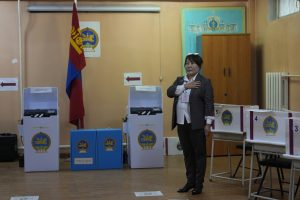Votes were being counted in Mongolia in a parliamentary election Friday in which both new and old political parties tried to win over disillusioned younger voters eager for change.
Preliminary results were expected by early Saturday morning after voting ended at 10 p.m. across the vast but sparsely populated country squeezed between China and Russia, two much larger authoritarian states.
At stake were 126 seats in an expanded parliament, 50 more than in the previous election in 2020. That contest was won by the Mongolian People’s Party (MPP) in a landslide. The governing party still appears to hold the upper hand, but other parties may be able to capitalize on voter discontent to eat into its majority.
By midnight and with about 88 percent of the votes counted, the MPP was leading. The main opposition Democratic Party appeared to be doing better than the last election.
Early in the morning, about two dozen voters lined up on a staircase leading to a polling station on the outskirts of Ulaanbaatar, some complaining because it opened 10 minutes late. Some of the older voters, including community leaders, dressed up in formal silk robes cinched with large leather belts for the occasion.
Inside, voters filled out their ballots behind a small screen and then put them into an electronic vote counting machine. Before they left, a purple dot was put on one of their fingers with a marker to prevent them from trying to vote again.
Turnout as of 10 p.m, when the polls closed, was 69.3 percent and was expected to reach 70 percent once results from remote districts are finalized and overseas voting is added on.
Mongolia, home to 3.4 million people, became a democracy in 1990 after more than six decades of one-party communist rule. While people have welcomed the freedoms that came with the end of the communist system, many have grown cynical of the parliament and its members, seeing them as working mainly to enrich themselves and their business associates.
The MPP has recognized those problems but largely blamed them on other political parties.
The prime minister, Oyun-Erdene Luvsannamsrai, said Friday that democracy and trust in the parliament are weakened when personal interest is put ahead of the national interest. He called for a new page of cooperation between the government and citizens after the first three decades of democracy.
“Today, a completely new 30 years in the history of Mongolia begins,” he told a crush of reporters after casting his ballot. “Let’s all together see how this representative parliament will work and how political parties will perform.”
The polling station on the outskirts of Ulaanbaatar is in a “ger” district, where many people first lived in nomadic tents after moving to the capital. It remains a poorer area, now a cluster of mostly simple homes, some still with tents in their yards.
Many residents of the district, particularly the older generation, support the MPP, which also ran the country during the communist era and then transformed itself into a center-left party in the democratic era.
Naranchimeg Lamjav, a 69-year-old MPP member and leader of the elderly community, was among a half-dozen voters in formal outfits who showed up at the polling station before its scheduled 7 a.m. opening.
“I support the current government led by Prime Minister Oyun-Erdene, because they are establishing justice and starting the new era of 30 years,” she said, wearing an embroidered blue robe.
But some younger voters expressed disappointment with the MPP and said they chose younger candidates who they hoped would bring change.
Enkhmandakh Boldbaatar, 38, said he voted for neither the MPP nor the main opposition party, the Democratic Party, saying they also had not performed well. Nineteen parties are vying for seats in the parliament.
“I’ve been living here for 38 years, yet the area is the same,” he said. “Only this road and some buildings were constructed. Things would have been different if they worked for the people.”
Corruption scandals have eroded confidence in the government and political parties. Besides the center-right Democratic Party, the HUN Party has emerged in this election as a potential third force.
In addition to corruption, major issues for voters included unemployment and inflation in an economy rocked first by the COVID-19 pandemic and then by the fallout from the war in Ukraine. The country’s livestock herders were also hit by a “dzud” this year, a combination of severe weather and drought, that killed 7.1 million animals.
Climate change and access to water in the water-stressed country weigh heavily on the minds of many herders, like Khandaa Byamba, 37, who lives in Dundgobi province in Mongolia’s Gobi Desert.
She told The Associated Press in an online interview that candidates had promised water in the region, where herders and mines are competing for scarce groundwater. Both are pillars of Mongolia’s economy.
“Global warming and climate change are very acute in Mongolia. The Gobi is in dire need of water. It is highly doubtful whether or not they will deliver on their promises,” she said.

































